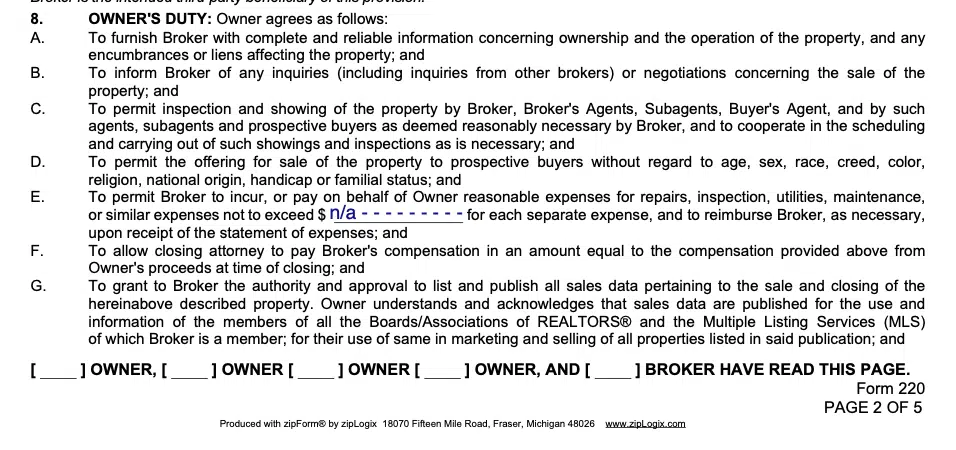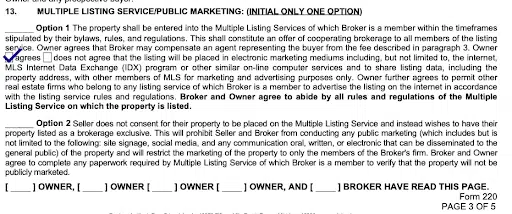
Published
What To Watch Out For | Why Exclusive Right To Sell Is Popular | Exclusive Right To Sell vs. Exclusive Agency | How To Cancel | Other Types of Listing Agreements
An exclusive right to sell listing agreement gives a single real estate agent the sole right to sell your home for a limited period of time, typically 3-6 months.
Under this type of agreement, your realtor markets your home to prospective buyers on the multiple listing service (MLS), and is paid commission when your home sells – regardless of who finds the buyers.
Home sellers can sign other types of listing agreements, but exclusive right to sell is the most common because it:
- Guarantees the agent is compensated when the home sells.
- Clearly defines the agent’s responsibilities to the client, and vice versa.
However, actual contract terms may vary by market. Find a real estate agent or an attorney for more specific advice tailored to your area.
🔑 Key Takeaways:
- An exclusive right to sell listing agreement is the most common agreement home sellers sign with realtors.
- “Exclusive right to sell” means an agent’s listing commission is guaranteed — regardless of who finds a buyer for the house.
- A typical exclusive right to sell agreement lasts 3-6 months, but the length of time can be negotiated.
- The agreements are legally binding, but your agent might be willing to terminate the agreement before it expires if you aren’t satisfied with their service.
How To Read an Exclusive Right To Sell Agreement
Real estate agents usually use a listing agreement template provided by their brokerage or their state’s real estate commission.
Exclusive right to sell agreements don’t always say “Exclusive Right to Sell” at the top, but you’ll always be able to tell what it is by the language in the agreement, which includes something to this effect:

Important details to note in an exclusive right to sell agreement
Here are some of the most important details you’ll find in the contract. Photos are from a real exclusive right to sell agreement form in South Carolina.
💰 Listing agent commission. The percentage or flat rate paid to the listing agent when the home sells. The fee usually ranges from between 2% to 3% of the sale price.
💸 Compensation to other agents. What the seller agrees to pay out to the agent who brings a buyer to the table. Buyer’s agent commission usually ranges from 2% to 3% of the final sale price, determined by the seller.

⏰ Duration of the agreement. Exclusive right to sell agreements typically have a term of 3-6 months. However, agents in a hot market might agree to a shorter term to earn your business.
Be wary of agents who ask for an agreement of more than 12 months. It’s best to avoid getting locked into that long of an agreement – you can lose the agent’s incentive to sell your house quickly.

🤝 Owner’s duty. Tasks or duties the seller agrees to perform as part of the listing process, such as allowing buyer’s access to the property for showings and inspections, and agreeing not to comply with your state’s fair housing laws.

✔️ Permissions. Actions the seller allows the agent to take to market the property. This typically include things like placing a lockbox on the front door, standing a “for sale” sign on the property, taking pictures, and showing the home to potential buyers.
The seller must initial “Option 1” indicating that the property is entered into the MLS (the system most realtors and brokers use to market and sell properties).

🔒 Lockbox authorization. If you agree to have an MLS lock box installed on your property to allow buyer’s access for showings, and an acknowledgment that realtors are not responsible for any damage to the property.

🕒 Extension period. The period of time after the agreement expires where the agent is still paid commission if one of the buyers they found ends up purchasing the property.
📹 Surveillance: An acknowledgment that your agent or broker may or may not disclose audio or video surveillance in your home to persons entering the property.

» LEARN: How to Sell a House: A Step-by-Step Guide
Why Are Exclusive Right To Sell Agreements so Common?
Exclusive right to sell agreements are common because they protect the agent, listing broker, and the home seller.
Guaranteed compensation is important to the agent, who pays for marketing costs upfront and only gets paid when your home sells. They benefit from not having to compete with other realtors for your business.
The home seller benefits from a clearly defined length of contract. The agent needs to sell your home by a specified deadline or potentially lose your business, so the agent has incentive to put in their best efforts.
Exclusive Agency Listing vs. Exclusive Right To Sell
Under an exclusive agency agreement, the agent can still earn a commission if they sell your house, regardless of which agent brings forth the buyer.
However, if you (the seller) find the buyer on your own, you don’t have to pay the agent a dime in commission.
Obviously, exclusive agency agreements are risky for real estate agents. Agents might spend money marketing your home, and time searching for buyers, only to make no profit in the end.
As a result, some brokers won’t allow their agents to sign an exclusive agency agreement.
Cancellation of an Exclusive Right To Sell Agreement
An exclusive right to sell agreement is a legally binding contract. Technically, it can’t be canceled — the seller has to wait for it to expire, usually in 3-6 months.
However, real estate agents build their business by maintaining a good reputation. Keeping a client locked into an agreement when they’re unhappy is bad for business.
You can usually get out of a listing agreement by simply asking your agent to cancel it, even if your contract hasn’t expired yet. You may have to request cancellation in writing or complete a form provided by the agent’s brokerage.
Some brokerages charge a cancellation fee so they can recoup some of their upfront marketing costs if a client backs out of a listing agreement. If there is a cancellation fee, it’s noted in your original listing agreement.
Other Types of Listing Agreements
Besides exclusive right to sell and exclusive agency agreements, there are a couple less-common types of listing agreements:
Net listing agreement
A net listing agreement allows a real estate agent to keep any extra money if the property sells for more than the listing price. For example, if the home is listed for $200,000 but sells for $225,000, the agent or listing broker earns $25,000.
However, net listings are widely considered unethical, and are illegal in many states. In addition, the National Association of Realtors (NAR) forbids net listings for its 1.4 million realtor members.
» READ: Why You Should Never Sign a Net Listing Agreement
Open listing agreement
Open listing agreements allow multiple agents to represent the seller. But only the agent who finds a buyer gets commission when the home sells.
Open listing agreements are risky for agent since commission isn’t guaranteed. But it can give home sellers the opportunity for maximum exposure as agents compete to find you a buyer.
» READ: What Is An Open Listing? (And How Does It Work?)
Next Steps
Your next steps include looking for an exclusive agent who can walk you through the various types of listing agreements, the local market and the home sales process, as well as your needs and goals as a seller.
Our friends at Clever can connect you with top agents across the U.S. who have experience in your market and with your specific type of sale.
Agent matching services like Clever are completely free. If you decide to use a Clever agent, you’ll pay discounted listing fees of only 1.5% when your home sells.
Related Articles
Want to learn more about selling a house? Check out some of our other resources!
How to Find a Realtor. We break down all of the ways you can find a realtor, including options that can help you save thousands on realtor commissions.
How to Sell a House. Learn everything you need to know about selling your home (with or without a realtor), from deciding when to sell, to setting a fair listing price and listing your home.
Seller Closing Costs. Selling a home can net you a nice profit, but there are costs along the way. Discover everything you need to know about seller closing costs.
What Companies Offer the Lowest Real Estate Commission Fees? Find out what companies you can turn to when you want a discount on real estate commission.
Selling a House After 1 Year or Less? You Need to Read This. If you’ve only owned your home for a short period of time, putting it up for sale comes with a whole different set of considerations. Find out everything that you need to know about selling a house after just one year!


Leave a Reply